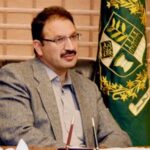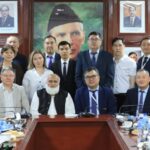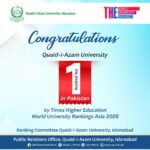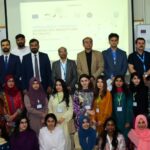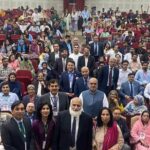International Conference on Balochistan: History and Culture
Balochistan Chief Minister Dr Abdul Malik on Monday stressed the need for bringing Balochistan in the mainstream of political, social, and economic landscape of the country.
“The inclusive and pluralistic approach is the dire need to address the grievances and deprivation of the people of Balochistan,” he said while addressing the inaugural ceremony of International Conference on Balochistan: History and Culture. Dr Abdul Malik Baloch said that the pressing issues that today’s Balochistan is facing must be addressed on priority basis.
National Institute of Historical and Cultural Research (NIHCR) Quaid-i-Azam University (QAU) Islamabad has arranged the 3-day International Conference on Balochistan: History and Culture in collaboration with Higher Education Commission of Pakistan.
He remarked “Culturally, economically and linguistically the province is very much diverse. Speaking different languages, they have similarities in their beliefs, moral orders and customs. The people of Balochistan are known for their hospitality. Open heartedness is one the most lovely features of the people of Balochistan”.
He was delighted that the NIHCR, QAU has organized the international event on Balochistan to promote an understanding in a diverged society. This event will provide new horizons and set new precedents for giving space and importance to the underdeveloped and smaller provinces, he said.
In his welcome address, Dr Eatzaz Ahmad, Vice Chancellor of Quaid-i-Azam University, Islamabad and the chief organizer of the conference, said that the QAU has been serving for the last 49 years to fulfill the needs of the higher education and research work in the country. Holding such seminars, symposia, and conferences is one of the goals of our university to enhance and promote the understanding of unexplored and ignored issues and fields, he said.
“Balochistan with largest proportion of land and thin population is in the limelight in the contemporary affairs. There is a dire need to think beyond its vitality as a geostrategic location. It is the time to think beyond the conflicts and understand its marvelous rich culture and history, Dr Eatzaz Ahmad observed.
Prof Dr Tahir Amin, Director National Institute of Pakistan Studies (NIPS) QAU, Islamabad delivered his brain storming key note address of the conference. Discussing multiple narratives about the current scenario of Balochistan he stressed upon the state to take some steps to coup with the complexity of situation effectively.
The NIHCR head Sajid Mehmood Awan, in his address, said it is a regular feature of the NIHCR to organize conferences, seminars, symposia, workshops, round table sessions and trainings for variety of issues and subjects. So far it has organized 18 National and International conferences and countless seminars, he said.
He also shared the inaugural resolution of that conference which says that “deadlock cannot resolve deadlock; only discourse can do that. Thus this conference initiates a discourse for resolution of every sort of deadlock on academic front”.
Dr Javed Iqbal, Vice Chancellor, University of Balochistan and Prof Dr Yar Jan Badini, Editor of Balochistan Today also spoke on the occasion.
Afterwards, proper proceedings of the conference started. The first day of the conference was dedicated to discuss history of Balochistan. The first academic session, which discussed Balochistan in Historical Perspective, was chaired by Prof Dr Riaz Ahmad, former Director, NIHCR. Ten guest speakers—Fozia Naz, Ifqut Shaheen, Sandul Hasan, Zulfiqar Ali Kalhoro, Fatima Asghar, Humera Naz, Jahanzeb Khan, Rafiullah Khan and Majid Hussain—explored the history of Balochistan during the first session.
They were of the view that Balochistan is rich enough in terms of ancient history and culture. This history garners a very special importance in relation to the development of Indus Civilization. The earliest settled villages in Balochistan date back to the ceramic Neolithic (c.7000-6000 BCE) including the site of Mehrgarh. The earliest built tomb on the Pakistani soil is located in Bela town and belongs to Muhammad bin Harun who was an Arab governor of Makran besides the historical tombs of the Jams of Lasbela. In 1520, under the leadership of Mir Chakkar Khan Rind, Balochs were ruling over Balochistan.
SESSION II – DAY 1
The second academic session, which discussed the British Period, was chaired by Dr M Iqbal Chawla, Dean Social Sciences and Chairman Department of History, Punjab University, Lahore. Seven guest speakers—Abdul Basit Mujahid, Barkat Shah Kakar, Dr Farah Baqai, Mohammad Asif, Dr Mohammad Shafique, Dr Munir Ahmad Baloch and Dr Farooq Ahmad Dar—presented their papers on Balochistan under the British.
They viewed that British Balochistan was predominantly a Pashtun province which voted for affiliation to Pakistan. The valiant Balochs had also resisted strongly against the British colonial rule in different areas of Balochistan for protecting their lives, land and honour. Being a Governor-General’s province, running the affairs in Balochistan, after the independence of Pakistan in 1947, was the “special responsibility” of Quaid-i-Azam Mohammad Ali Jinnah.
SESSION III – DAY 1
Ten guest speakers—Ghazi Mohammad Abdullah, Dr Yaqub Khan Bangash, Noor Jamal, Dr Naumana Kiran, Fakhar Bilak, Akhtar Rasool Bodla, Mohammad Hassan, Farah Aman, Mehreen Baloch and Rahat Zubair—spoke on Balochistan after Independence during the third academic session, which was chaired by Prof Dr Tahir Amin, Director, NIPS, QAU, Islamabad.
The speakers informed that Balochistan holds a rich history of being the part of the ancient kingdoms such as under Ashoka and then attacked by the Mongols in thirteen century in which its polity was greatly destroyed. The advent of the British in the nineteenth century witnessed the region as ruled in multi zones. Baloch political leaders Sardar Ataullah Mengal, Khair Buksh Marri and Akbar Bugti were the ones who played a prominent role in Baloch politics. Baloch, who constitute the majority of population, has always been in conflict with state for greater control of the resources, yet it has a troubled history and problematic relations with the Centre since the inception of Pakistan.
SESSION IV – DAY 1
Contemporary history of Balochistan was discussed in the fourth academic session of the conference, chaired by Prof Dr Fakharul Islam. Five guest speakers—Para Din, Syed Mukarram Shah Gilani, Usman Kakar, Nargas Raza and Nazir Ahmad Kasi presented their papers.
They opined that political, cultural and economic developments in Balochistan have dominated the economic, political and cultural mobilization. The potentials of development have forced the economic and political tigers to say that the future of Pakistan lies in the future of Balochistan. Balochistan is fast moving from the parochial systems of economy and politics to the modernization and democratization.
 PM’s Laptop Scheme’s Provisional List has been shared with Department Focal Person. Check your status, please
PM’s Laptop Scheme’s Provisional List has been shared with Department Focal Person. Check your status, please



